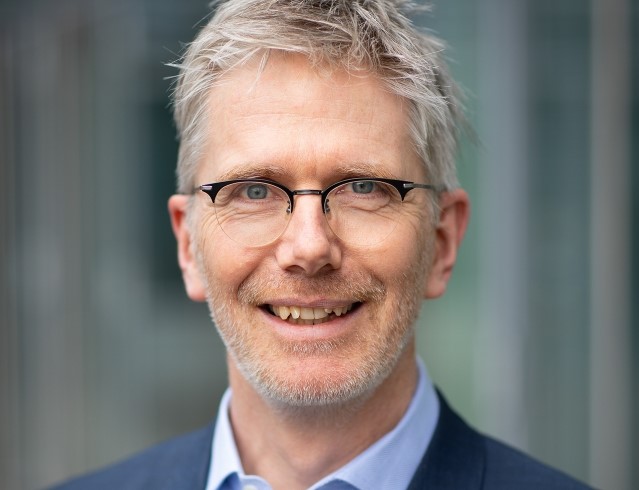Prof. Rutger Schlatmann is Chair of the European Platform for Photovoltaics

Rutger Schlatmann become the newly elected Chair of the European Technology & Innovation Platform for Photovoltaics (ETIP PV). © HZB/M. Setzpfandt
Rutger Schlatmann is a solar expert from the Helmholtz-Zentrum Berlin (HZB) and professor at the Berlin University of Applied Sciences. At the HZB he heads the Competence Centre for Photovoltaics, which successfully brings together solar research and industry. Now the expert has been elected as chairman of the European Technology and Innovation Platform for Photovoltaics (ETIP PV). It provides independent advice on energy policy issues and the expansion of photovoltaics in Europe.
Schlatmann is supported by David Moser, who is a member of the Board of Directors of the Association of European Renewable Energy Research Centers (EUREC) as well as Jutta Trube, Division Manager of VDMA Sector Group Photovoltaic Equipment, who was elected as the new Vice-Chairperson of the ETIP PV Steering Committee.
For a healthy photovoltaic ecosystem in Europe
Following his election, newly elected ETIP PV Chair, Rutger Schlatmann, expressed his optimism:
“Photovoltaic solar energy in Europe and globally has entered a new and decisive phase. The technology is ready to take a major role in the transition towards a fully renewable energy system. Still, there is ample room for further innovations and continued efforts are necessary to maintain Europe’s position at the technological forefront. ETIP PV has outlined this innovation potential in the recent Strategic Research and Innovation Agenda for Photovoltaics (SRIA).”
Schlatman emphasises that technological leadership and security of energy supply can only be upheld with a thriving and complete supply chain for solar module production on the continent. “Therefore, ETIP PV and its partners will continue to strive for a healthy photovoltaic ecosystem in Europe” he adds.
About European Technology and Innovation Platform for Photovoltaics (ETIP PV)
The European Technology and Innovation Platform for Photovoltaics provides advice on solar photovoltaic energy policy. It is an independent body recognised by the European Commission as a representative of the photovoltaic sector. Its recommendations may cover the areas of research and innovation, market development including competitiveness, education and industrial policy.
Here you find the long version of the press release.
(red.)
https://www.helmholtz-berlin.de/pubbin/news_seite?nid=24136;sprache=en
- Copy link
-
What Zinc concentration in teeth reveals
Teeth are composites of mineral and protein, with a bulk of bony dentin that is highly porous. This structure is allows teeth to be both strong and sensitive. Besides calcium and phosphate, teeth contain trace elements such as zinc. Using complementary microscopy imaging techniques, a team from Charité Berlin, TU Berlin and HZB has quantified the distribution of natural zinc along and across teeth in 3 dimensions. The team found that, as porosity in dentine increases towards the pulp, zinc concentration increases 5~10 fold. These results help to understand the influence of widely-used zinc-containing biomaterials (e.g. filling) and could inspire improvements in dental medicine.
-
Element cobalt exhibits surprising properties
The element cobalt is considered a typical ferromagnet with no further secrets. However, an international team led by HZB researcher Dr. Jaime Sánchez-Barriga has now uncovered complex topological features in its electronic structure. Spin-resolved measurements of the band structure (spin-ARPES) at BESSY II revealed entangled energy bands that cross each other along extended paths in specific crystallographic directions, even at room temperature. As a result, cobalt can be considered as a highly tunable and unexpectedly rich topological platform, opening new perspectives for exploiting magnetic topological states in future information technologies.
-
MXene for energy storage: More versatile than expected
MXene materials are promising candidates for a new energy storage technology. However, the processes by which the charge storage takes place were not yet fully understood. A team at HZB has examined, for the first time, individual MXene flakes to explore these processes in detail. Using the in situ Scanning transmission X-ray microscope 'MYSTIIC' at BESSY II, the scientists mapped the chemical states of Titanium atoms on the MXene flake surfaces. The results revealed two distinct redox reactions, depending on the electrolyte. This lays the groundwork for understanding charge transfer processes at the nanoscale and provides a basis for future research aimed at optimising pseudocapacitive energy storage devices.
